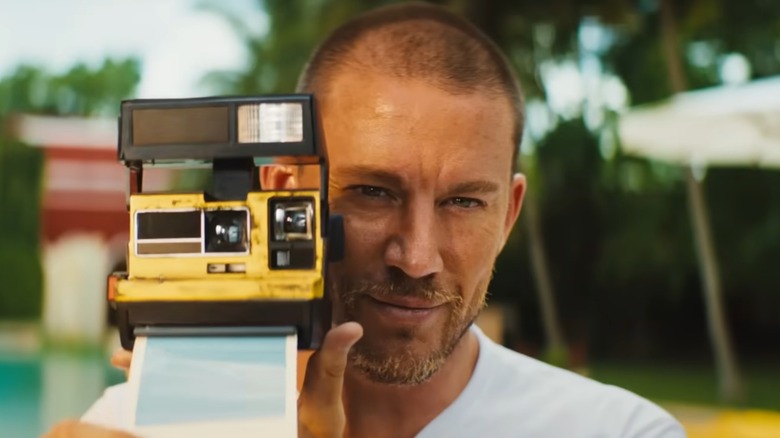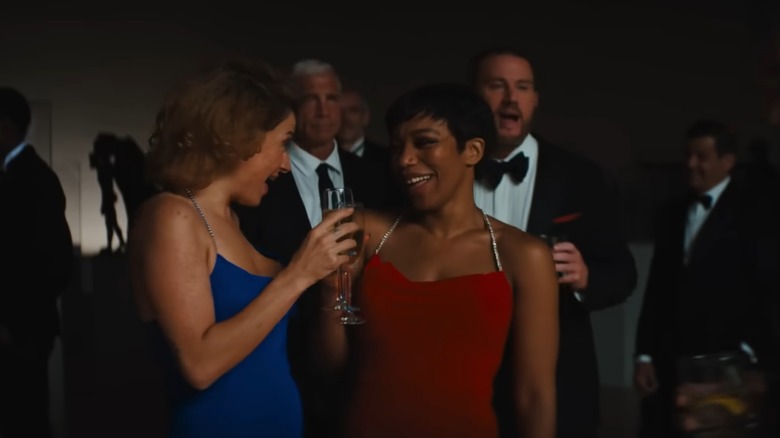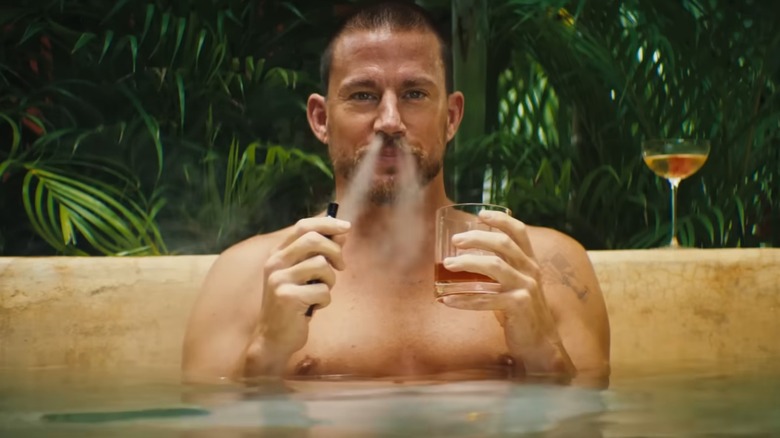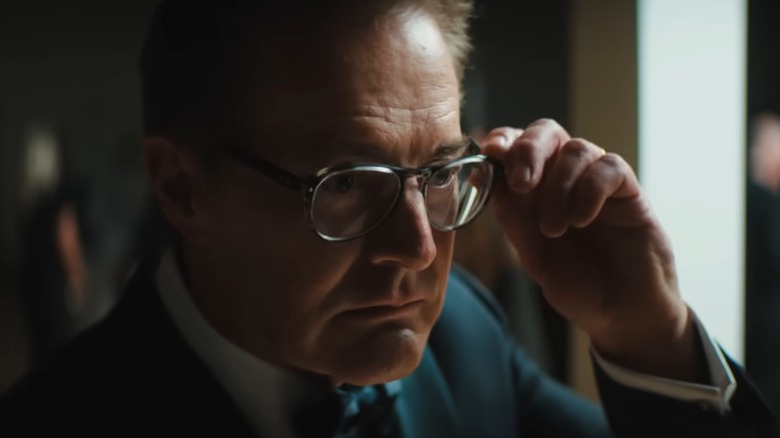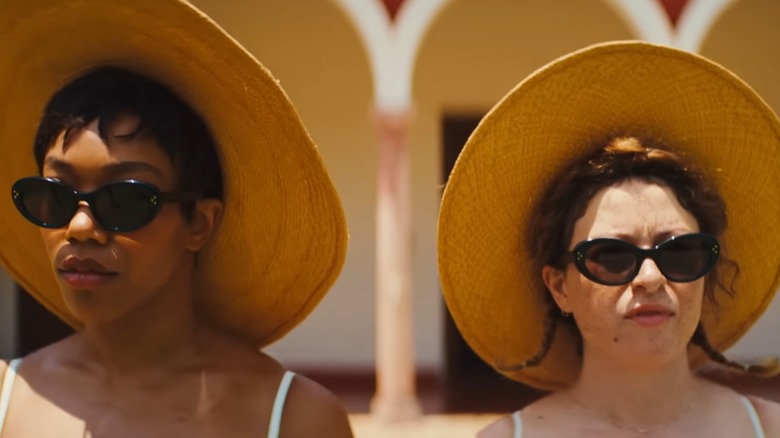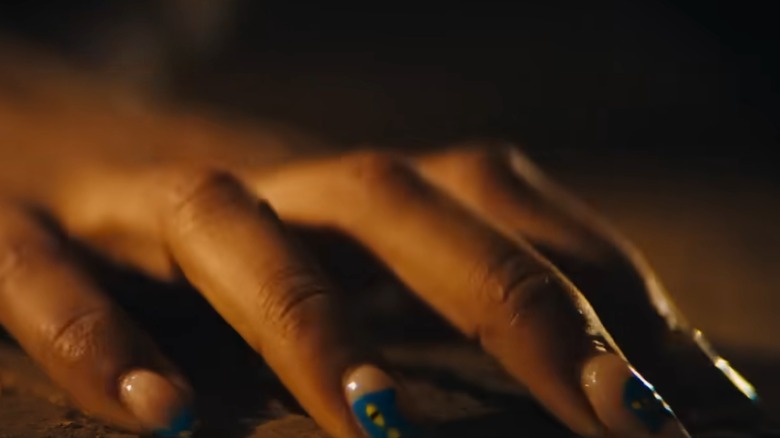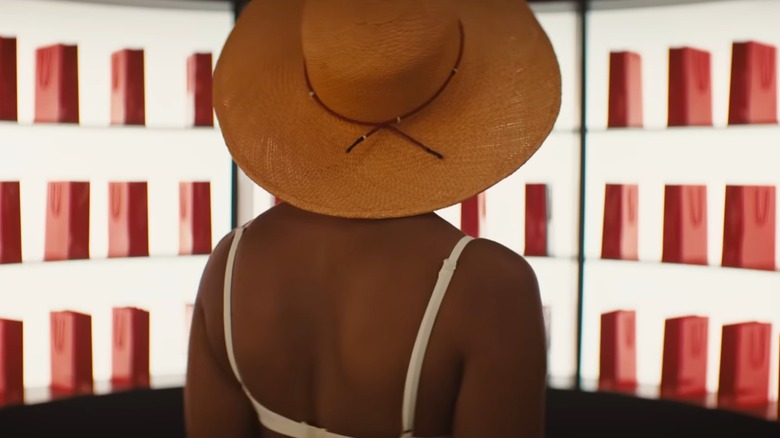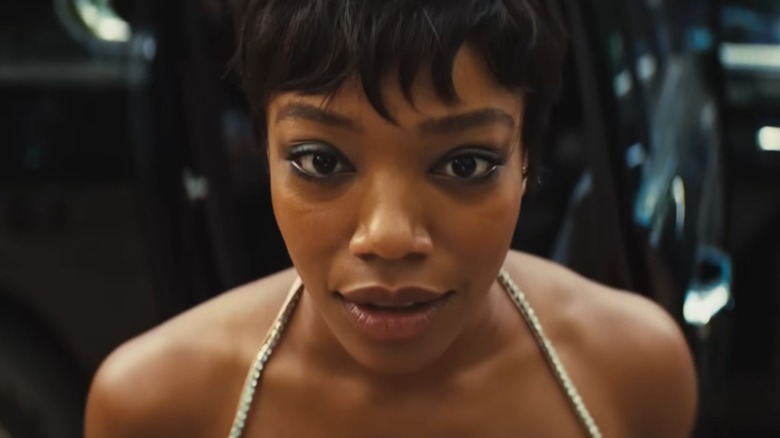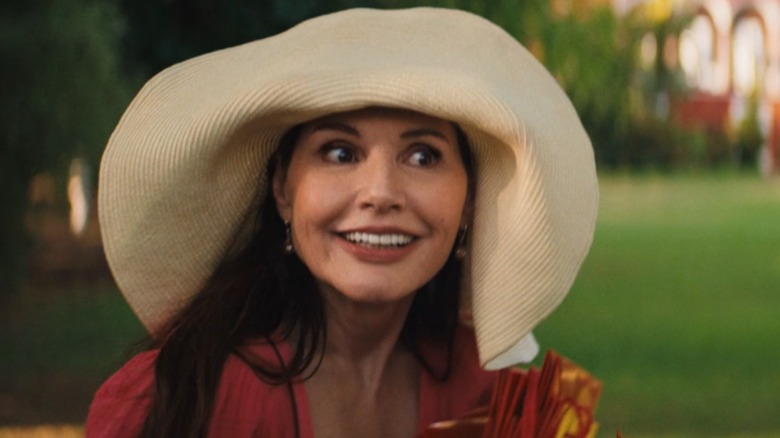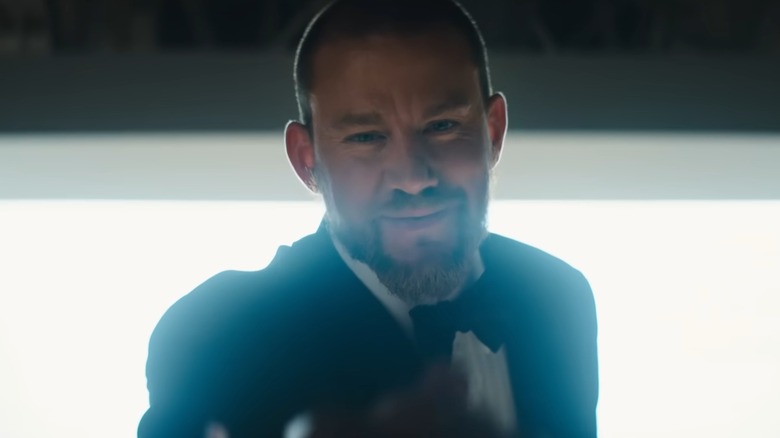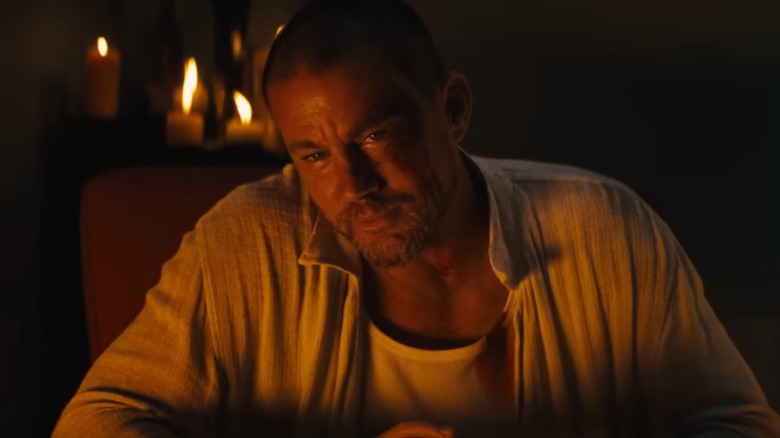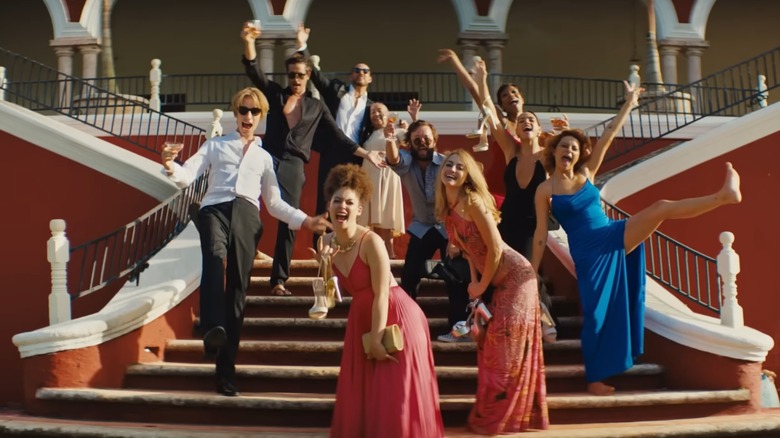The Ending Of Blink Twice Explained
The transformation of Zoe Kravitz has been quite something to see. Everyone knew that Kravitz could act — from being one of the best things about "The Batman" to shining in every scene of the "High Fidelity" TV series, we'd all seen her do it before. However, plenty of people can act, but most of them wouldn't make good directors. There was no guarantee that Kravitz's directorial debut, "Blink Twice," would be able to stand up next to her acting career, but it looks like she really has a future in the director's chair.
In our review of "Blink Twice," we praised the film's satirical strength and Kravitz's control as a director. The movie might not be flawless, but it could easily end up being remembered as one of the best directorial debuts from an actor. From a fairly straightforward premise about a rich CEO's private island, where men are allowed to play out their most grotesque fantasies, Kravitz is able to extract layers upon layers of meaning.
"Blink Twice" is the kind of movie that sticks in your brain for days as you work back through the hints, insinuations, and hidden secrets that are peppered throughout the film. The movie doesn't have one of the most confusing endings put to film, but it definitely leaves you hanging in the best way possible. If you're still trying to piece together "Blink Twice" on your own, we're here to help you make sense of everything that's going on in the movie's shocking final moments.
What you need to remember about the plot of Blink Twice
The beginning of "Blink Twice" introduces us to Frida (Naomi Ackie) and quickly establishes that she's borderline obsessed with a tech CEO named Slater King (Channing Tatum). Frida works as a server at an event venue, where a year earlier Slater complimented her fingernails during a chance encounter. This year, as Slater is set to arrive at the venue again for an annual conference, Frida has a plan to potentially speak with him again.
While working at the event, Frida and her friend Jess (Alia Shawkat) change into formal dresses and sneak into the party. As luck would have it, Frida runs into Slater again, and the two hit it off. At the end of the event, Slater asks if Frida and Jess would like to come with him and his friends to his private island for a few days. Ecstatic, the women agree and are whisked away for an all-expenses-paid tropical vacation.
Frida and Jess get to relax in the lap of luxury, enjoying gourmet food and a steady supply of recreational drugs while spending time with Slater and his friends. At first the situation seems perfect, but as the days drag on, Frida and Jess begin to get a nagging feeling that everything isn't as it seems. When Jess vanishes, Frida finally realizes that she's landed herself in a dangerous situation.
What happened at the end of Blink Twice
With the help of Sarah (Adria Arjona), another woman invited to the island by Slater's friends, Frida makes a terrifying discovery. Slater and the other men have been using a perfume infused with a island-native flower called desideria to make the women lose their memories. Every night the men have been sexually abusing the women and forcing them to forget what happened. When Jess is bitten by one of the island's snakes, with the venom causing the desideria to lose its effectiveness, Slater kills her because she remembers everything and can't be made to forget again.
Frida and Sarah find a supply of snake venom and use it to help themselves and the other women on the island regain their memories. A massive fight breaks out on the island as the women start attacking Slater and his friends. By the end, only Frida, Sarah, and Slater are left alive, but Frida has a way to guarantee she and Sarah make it off the island alive. Frida sneaks some of the desideria concoction into Slater's vape, and when he smokes, his memory of the fight completely fades.
At the very end of the movie, we jump forward a year to the next annual conference for Slater's company. Frida and Slater are both in attendance, and Frida is now the CEO of the company. She's been continually dosing Slater with desideria to keep him under her control, and now she seemingly runs his life.
What's the real meaning of the title?
As far as movie titles go, "Blink Twice" is pretty effective. It doesn't reveal anything about the plot of the movie, but it manages to succinctly convey the ominous tone of the entire story. We hear the phrase "blink twice" pretty early in the film, when Frida is first talking to Slater. Their conversation is interrupted by Slater's therapist Rich (Kyle MacLachlan), and Frida jokingly asks him to blink twice if she's in danger. Rich does, and we could take that to mean he's giving her a genuine warning. But considering that he's directly involved with the development of desideria, his reaction to Frida's joke seems much more like a sick taunt.
That interaction in the movie is possibly where the title came from because originally, writer-director Zoe Kravitz had a completely different title in mind. When she first came up with the idea for this story, she called it "P**** Island." The movie actually kept that title almost up to the point of release, but ultimately the studio pressured her to change it because it didn't test well. Kravitz told Esquire, "What's interesting is that they tested the title and the people who were most offended were women." Kravitz's original title would have gotten at the heart of the story more directly, but the evocative nature of "Blink Twice" arguably works even better at complimenting the movie's complicated themes.
What happened the first time Frida went to the island?
There are a few devious twists in "Blink Twice," but one of the biggest is the reveal that Frida has been on Slater's island before. During the bloody events at the end of the movie, Slater tells Frida that she's been there before, and that he's amazed by how well the desideria worked on her. Suddenly Frida puts some puzzle pieces together: Slater's maid (María Elena Olivares) keeps saying "red rabbit" to her because she'd had red rabbits on her fingernails the year before. Vic (Christian Slater) is missing a finger because Frida bit it off during a confrontation that also left her with a scar on her temple.
The fact that Frida has been to the island before has some serious implications. It means that when Rich blinks twice at Frida during the conference, he knows that she's already been brutally assaulted and will be again. It also means that Slater isn't exactly lying when he tells Frida near the end of the movie that she's his best friend. The first time Frida was on the island, Slater noticed that the desideria worked especially well on her, and he let her go to see if the effects could last an entire year. Slater is basically obsessed with the idea of forgetting, and the more trauma Frida forgets, the more he feels attached to her.
What's the real meaning of Frida's nails?
Frida is a nail artist, and she maintains an Instagram account dedicated to her art. Frida remembers Slater complimenting her nails, and she thinks that's why she's infatuated with him. Once on the island, Frida explains why she calls her animal-themed nail art "Anailmals," and it's painfully obvious that Slater himself isn't really interested in what she's doing.
Frida's nails are a nice character detail that help us get a deeper sense of her passions. They also highlight the differences between herself and Slater. Frida is driven by creativity, whereas Slater is really only driven by controlling the things that are right in front of him. Beyond that bit of character insight, the three specific nail designs that we see throughout the movie also might tie into specific themes.
As noted earlier, the "red rabbit" line that Frida hears over and over again is a reference to the design of her nails the first time she was on the island. The rabbit symbolizes Frida's position as an innocent captive during that ordeal, and the red matches the color of desideria to symbolize her amnesia. The blue cats Frida wears throughout the movie could represent her curiosity about Slater and the truth about the island. Finally, at the end of the movie, Frida wears little red flowers, perhaps symbolizing her control of desideria and, through the flower, Slater's company.
How do colors play into the meaning of the story?
Frida's nails aren't the only images in "Blink Twice" that have some serious symbolic significance. The movie cleverly uses a few different colors as motifs throughout the story. Red is probably the color that most viewers notice first because the movie really emphasizes it when Frida reaches the island. Red symbolizes danger. It's the color of the desideria flower, and it's also the color of the gift bags that are featured prominently in the first half of the film and that ultimately clue Frida into the sick game that Slater and his friends are playing.
Blue comes up as a counterpoint to red. Frida has blue nails when she arrives on the island, and the room that Slater lets her stay in is painted blue. The color might subtly clue viewers into the fact that Frida doesn't know what's really going on, and, more importantly, that she's forgotten something big from her past.
The other color that pops up repeatedly in "Blink Twice" is yellow. Jess's favorite lighter is yellow, and so are the snakes that roam the island. Yellow may represent the potential to remember — like how Jess's lighter reminds Frida that her friend is missing — and because of that, yellow also represents safety. Ironically, when violence finally breaks out on the island, Tom (Haley Joel Osment) is wearing yellow sunglasses that get splattered with blood before he's drowned in a pool. The women on the island regain their memories, and because of that, the men lose their safety.
How does Frida's past affect the ending's meaning?
Frida makes a pretty bold decision at the end of the movie. After everything that Slater did to her and countless other women, Frida decides not only to let him live, but also to let him avoid any real legal consequences for his actions. She decides to manipulate Slater to make her the CEO of his company, but even then, his presence is a constant threat to Frida's life.
Frida's choice only really makes sense when you consider her past. We don't know much about Frida's life before the events of the movie, but we do know that she had an extremely traumatic childhood. Frida discusses her trauma with Slater, and though she doesn't explore the ins and outs of everything that happened to her growing up, she does reveal that she discovered her mother's body after her mother committed suicide. At another point in the movie, Frida also relays a piece of advice her mother once gave her: the best revenge is success.
From the very beginning of the movie, it's clear that Frida craves a lifestyle like Slater's. She wants to be rich and successful, but that's only half of the reason why she takes over Slater's company. Really, Frida takes over Slater's life and successfully runs his business because in her mind, that's the only way to get back at him for everything he did.
How does Stacy's role change the meaning of the story?
"Blink Twice" is a story about women taking back power from men who have abused them, but there's one character who seriously complicates the message. Stacy (Geena Davis) is Slater's assistant, and she's had first-hand involvement in all of his crimes. At the same time, Stacy is a victim of desideria, too, and Frida helps her regain her memories with snake venom. Unfortunately, Stacy isn't happy about remembering, and she takes out her anger by trying to murder Frida.
Ultimately, Frida kills Stacy after explaining that she was just trying to help her. Stacy's character functions as a metaphor for the way that different generations have responded to trauma and a patriarchal society in general. Writer-director Zoe Kravitz said as much when she told IndieWire that she holds Stacy and the people she represents in high esteem. "I feel, again, so much compassion for that generation," she explained, "or any generation before this that didn't have the community and the voice to say, 'Hey, me too. Let's talk about this.'"
Stacy, like Slater, believes that forgetting is a gift, and the movie argues that it's possible to feel compassion for that point of view while also insisting that it unintentionally makes things worse for everyone.
What does Slater's monologue at the end really mean?
Near the end of the movie, when Slater believes he has the upper hand on Frida, he stops to explain his viewpoint to his last victim. Slater tells Frida that she's basically his best friend because her capacity to forget reminds him of his own. Then he argues that forgetting trauma is the only solution someone can pursue because he doesn't think forgiveness is possible. To drive his point home, Slater apologizes over and over again for what he's done to Frida before asking her if she forgives him. Frida, of course, says she doesn't, and Slater thinks that means he's right.
Forgiveness versus forgetting is one of the central themes of the movie. We know that Slater doesn't believe in forgiveness, but it's not entirely clear that Frida agrees with him. She doesn't forgive Slater when he apologizes, but that's partly because Slater is misunderstanding the point of an apology in the first place. When he apologizes to Frida, Slater seems to genuinely feel remorse, but he also doesn't make any commitment to change.
From Frida's perspective, it's not enough for Slater to feel bad about what he's done. He needs to actively change his behavior in the future, rather than just make himself and others forget. In the end, Frida forces Slater's behavior to change, but whether or not that means she's forgiven him is up for debate.
How did Channing Tatum change the ending?
Channing Tatum is one of the stars of "Blink Twice," but he's also one of the people who helped shape the story into what it is. Zoe Kravitz always had Tatum in mind to play Slater, and she approached him with an early version of the script. While the two communicated back and forth about the movie, they eventually struck up a relationship and are now engaged. Along the way, Tatum also changed the ending of the movie.
Kravitz told Vanity Fair that she always intended for Frida to be in Slater's position as CEO by the end of the movie, but she didn't always know the two of them would both make it to the movie's final scene. "There was a very early version of the script where things went down in flames and he just died and that was the end," Kravitz explained, "and Chan was just like, 'Slater can't die. It's too easy.'"
Kravitz took Tatum's advice and "Blink Twice" got an ending that's much more nuanced and difficult to parse than it might have been otherwise. The relationship between Frida and Slater is complicated, and there are so many different ways to interpret the fact that they're together at the very end of the film. "That look [Frida gives] at the end of the movie, in my mind, is the Mona Lisa of looks," Kravitz said. "Is she happy? Is she angry? Is she like, 'F***, yeah! Is she sad? It's all these things at once and it's so stoic and interesting. I don't think there's a right answer."
Will there ever be a Blink Twice 2?
"Blink Twice" is undoubtedly a successful debut for Zoe Kravitz as a director. The film performed about as expected in its opening weekend, and it went on to make $46 million at the global box office – more than twice its budget. That's pretty decent, despite how the sensitive subjects that get explored in "Blink Twice" might have turned some people away. What's more, the movie received some glowing reviews, earning a 75% approval rating on Rotten Tomatoes.
With that said, we've all heard about having too much of a good thing. "Blink Twice" is a remarkable story that's dense with meaning, packed with thrills, and bolstered by some moments of genuine humor. Audiences will probably be excited to see Kravitz in "The Batman: Part II," but it would also be interesting to see more from her as a writer and director. Despite that, the odds of her coming back to the world and characters of "Blink Twice" seem pretty slim.
Even though there might be more to explore with desideria and the other strange facets of Slater's island, Frida's story is about as wrapped up thematically as it possibly could be. Seeing more of her could potentially ruin the Mona Lisa-like ambiguity that Kravitz appreciates about the ending. Then again, there's something else we've all heard before: never say never.
If you or anyone you know has been a victim of sexual assault, help is available. Visit the Rape, Abuse & Incest National Network website or contact RAINN's National Helpline at 1-800-656-HOPE (4673).
